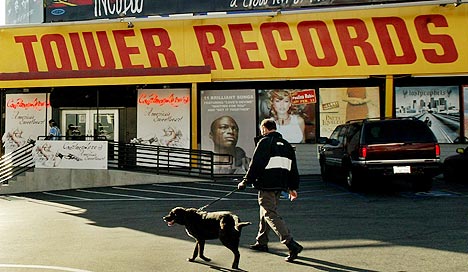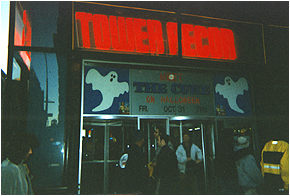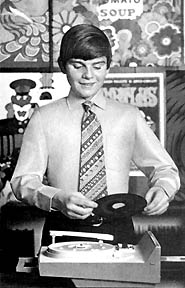
When Are We Going To Let The Hippies Back Into The Record Store?

The following article was named an "Editors Pick" at http://blogcritics.org for the week ending October 12, 2006
So let me go ahead and say out loud what everybody has known for at least a couple of years now.
The music industry is officially dead.
What blows my mind is not only the way nobody will come right out and acknowledge the obvious, but the way those who do sort of see the writing on the proverbial wall try to rationalize just what the hell happened.
In case you haven't heard Tower Records this weekend became the latest casualty of the music business, and will soon close some ninety stores, costing some three thousand record store clerks their jobs.

Now, you've gotta understand something about Tower Records. For at least a couple of decades now, Tower has represented the very epitome of the ultra-hip record store.
When you think of the type of snotty, hipper than thou record store employees sitting behind a counter with their green hair and multiple piercings snickering as you bring your copy of the new Kenny G album up to the register, nothing comes to mind quicker than Tower. Admit it. You've been there, and so have I (though in my case it was probably something by Genesis rather than by Kenny G).
Pain in the ass that these ultra-hip, underpaid record store jockeys could be, they were essentially a big part of what made the wheels turn for the record industry at large. They were the proverbial oil in the grease. Simply put, they were record guys (and gals). You see, the record business up until very recently was a very unique animal. It was the one job in the universe where you basically didn't have to worry about showing up to work hungover, because the chances were pretty damn good that your co-worker was out checking out the same band as you in some club the night before.

Record stores like Tower--but to a much greater extent the smaller Mom And Pop indies--used to be a place you could go to not only get good recommendations on the latest music, but maybe even a leftover promo poster or bumper sticker. Once you got past the snotty, hipper than thou persona of the underpaid guy behind the counter with the green hair, chances were pretty good you could make a valuable connection with a music expert. Especially if you connected with that person on a common ground of musical interest. I mean these guys didn't work for minimum wage for nothing.
They did it because they loved the music--man.
To a much larger extent, this extends all the way up the ladder up to the guys running the show in their ivory towers at the record companies in New York and L.A. You see, once upon a time the guys who sat in these offices were music fans just like you and me. Bands were signed based on actual talent and potential rather than marketable good looks and the ability to draw a quick nickel based on a good gimmick.

Today, a band like Cheap Trick for example (who were nearly dropped by Epic Records back in the days of a much more music friendly climate) wouldn't make it past their first record if it failed to move 250,000 or so units. Record companies today have become so concerned with the bottom line that long-term careers are no longer allowed to develop. Of course there are exceptions to this--the folks at Capitol for example are no doubt pleased with the way Coldplay turned out even as they wring their collective heads over Radiohead's more "experimental work" of the past couple years.
But by and large, the attention spans of the folks calling the shots at the record labels have become as short as Prince on his worst day. Artists are no longer looked at as long term investments. Which means that yesterday's pretty face like Britney Spears is simply shoved aside to make way for tommorrow's Justin Timberlake. Say what you will about guys like Dylan, the Stones, or Pink Floyd. But nobody could rightfully ever accuse them of being pretty faces.
But what is really killing the music business is all this downloading right? Think again. I heard this very same argument about home taping some twenty years or so ago and it holds as little water now as it did back then. The bottom line is your every day average music fan--who usually can't hear the cool new bands on the radio anyway--will check out a song or two, and if he likes what he hears will probably end up buying the whole damn album.

Which brings us back to that green haired record store geek sitting behind the counter at Tower. Music is a very personal business, and forging a personal relationship with your local record store jockey can make all the difference in the world. Sadly, the apparent demise of Tower is just one more nail in the coffin of that dead horse. But then you could always take your business over to the cellphone kiosk at the Supermall.

Because cellphones are apparently the delivery system of choice for music fans today. At least if you are buying into the bill of goods the record industry wants to sell you. When it comes to choice, I suppose this could even be considered a good thing. Since the blow-dried pop idols the record industry chooses to shove down our collective throats these days might have one or two decent tracks on an album, you can pretty much pick and choose your song choices.
But the question simply has to be asked here. What motivation does that leave an artist with to create work that reaches further than the three minute pop tune or flavor of the minute gangsta rap song?
Somewhere out there is a Bruce Springsteen waiting to create the next Born To Run. God willing, there may even be a future Brian Wilson with a work as artistically expansive as Pet Sounds lying in wait. But consider this...
If there are actually guys like that still out there (and I have little doubt that there are) banging their craft away in some garage, what motivation do they actually have? First of all, chances are they wouldn't make it past their first record assuming they actually got signed to a deal at all unless it moved a zillion or so copies. Second, if they have anything in them with a creative reach beyond that of your average housewife, what good will it do if your potential listener is most likely going to end up hearing it on a speaker smaller than your thumbnail? And finally, what difference does it make when the idea of creating pop music that goes anything beyond the reach of a hooky single has become as obsolete as the fifties?
Oh wait a second. The music industry has gone back to the fifties hasn't it?

And people wonder why records aren't selling anymore.
R.I.P. Tower.
No comments:
Post a Comment